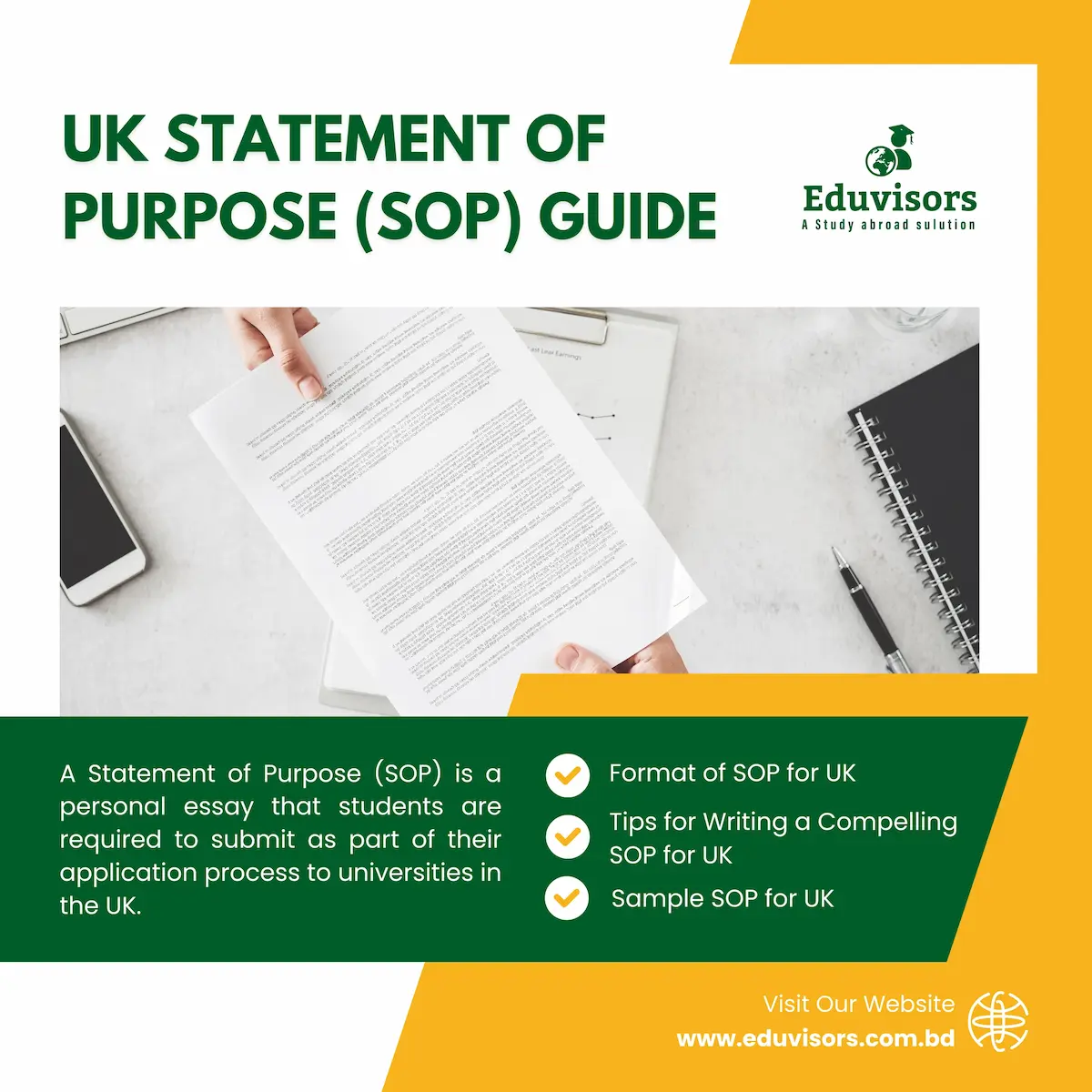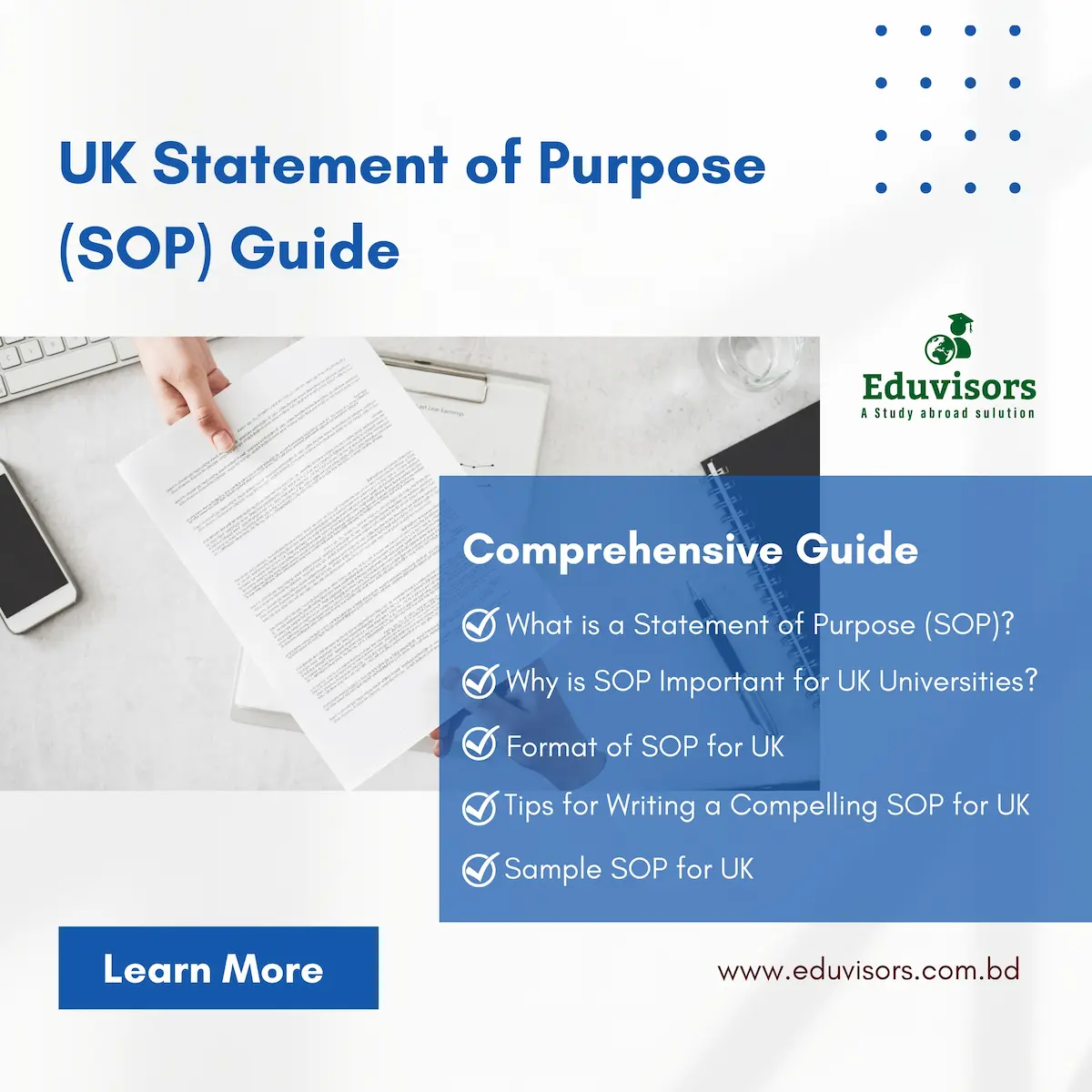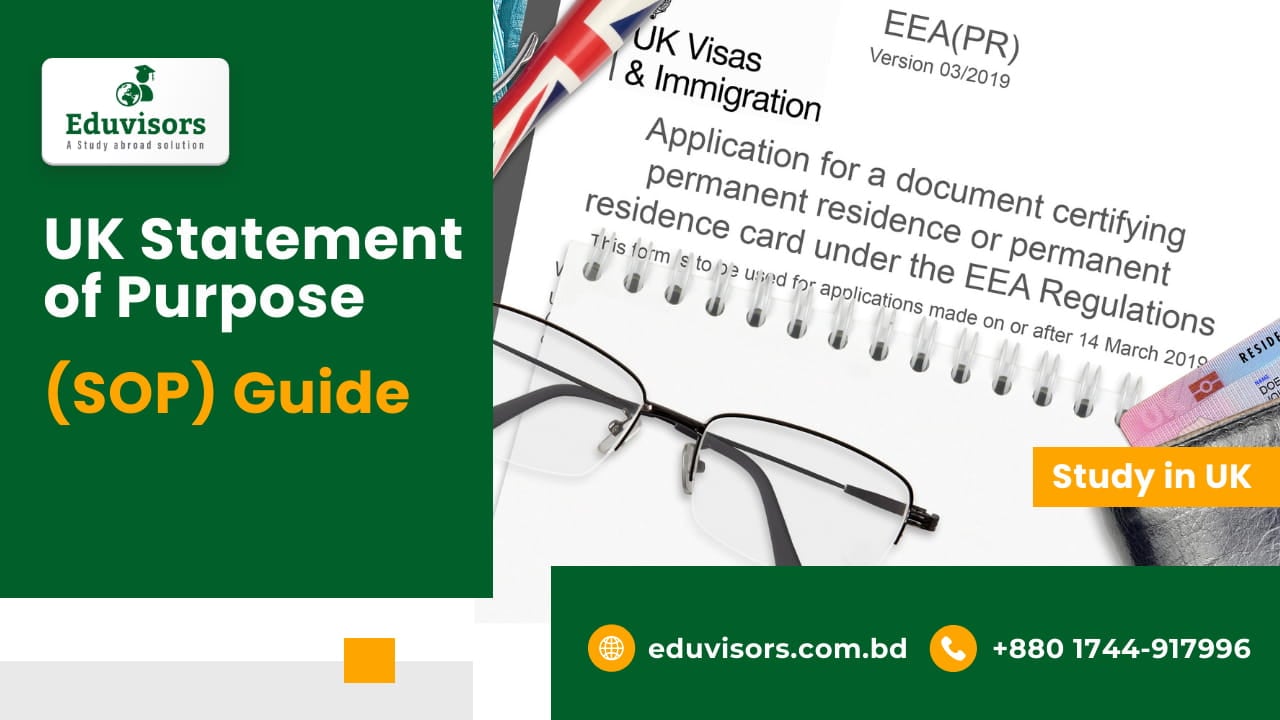SOP for UK students is a document that outlines your academic and professional background, your goals for pursuing further education, and your reasons for choosing the specific program and institution you’re applying to. It’s an essential part of your application that can help admissions officers determine whether you’re a good fit for the program.
Writing an effective statement of purpose can be challenging, especially if you’re unfamiliar with the format for UK universities and requirements. Many resources are available to help you craft a strong statement of purpose that showcases your strengths and highlights your potential as a student.
In this article, we’ll provide you with a comprehensive guide to writing an impressive UK SOP for universities, including a sample template and tips for making your application stand out.
Whether you’re applying to study in the UK for an undergraduate program, a postgraduate degree, or a research position, a well-written SOP can make all the difference in your application. With the right approach and a clear understanding of what admissions officers are looking for, you can create a compelling document that sets you apart from other applicants and demonstrates your readiness for academic success in the UK.

What is a Statement of Purpose (SOP)?
A Statement of Purpose is a personal essay that students are required to submit as part of their application process to universities in the UK. The document sets out a student’s academic background, career goals, and reasons for applying to a particular course or program.
The aim of writing sop for UK is to convince the admissions committee that the student is a good fit for the course and the university and that they have the necessary skills and motivation to succeed.
The SOP is an essential part of the application process, as it provides the admissions committee with an insight into the student’s personality, interests, and aspirations. It allows the committee to assess the student’s suitability for the course and the university and to determine whether the student will be able to contribute to the academic community.
Writing a winning SOP can be a daunting task, as it requires students to reflect on their academic and personal experiences and to articulate their goals and aspirations. With careful planning and preparation, students can create a compelling SOP that showcases their strengths and demonstrates their potential for success.
Why is SOP Important for UK Universities?
The SOP is your opportunity to showcase your personality, skills, and achievements to the admissions committee. It is a chance to convince them that you are the right candidate for their program.
SOP format for UK universities is essential because it helps them assess your suitability for the course you are applying for. It allows them to evaluate your academic background, your research interests, your career goals, and your potential to contribute to the university community.
SOP provides a glimpse into your personality, your critical thinking skills, and your ability to communicate effectively. It helps the admissions committee understand why you are interested in their program and how you can benefit from it.
SOP is a way for UK universities to differentiate between applicants who have similar academic backgrounds and qualifications. It allows them to select the best candidates who have a clear vision of their future and can articulate it well.
SOP is your chance to stand out from the crowd and make a lasting impression on the admissions committee.
How does SOP for UK differ from other countries?
When writing a Statement of Purpose , it is essential to understand that each country has its specific requirements and expectations. The same goes for the UK, where the SOP format is unique and different from other countries. Here are a few key differences:
| Country | Word Limit | Focus |
|---|---|---|
| UK | 600-900 words or 4000 characters | Passion for courses, seminars, conferences, and books |
| USA | 500-1000 words | Personal background, academic achievements, and future goals |
| Australia | 500-1000 words | Academic achievements, work experience, and future goals |
One of the main differences in the UK SOP is the focus on the applicant’s passion for the chosen course, seminars, conferences attended, and books read. It is important to show a genuine interest in the subject matter and demonstrate how it aligns with your future career goals.
Another important aspect to consider is the word limit. The UK SOP has a limit of 600-900 words, which is shorter than the SOP for other countries. Applicants must ensure that they stay within the word limit, as exceeding it can result in immediate refusal.
The UK SOP must require applicants to provide a brief introduction that shares their academic and professional background and a vision of their future career goals. This is followed by a detailed description of their professional experience, which must be written in a clear and concise manner.
By following the specific SOP format for UK and highlighting your passion for the subject matter, you can increase your chances of being accepted into your desired program.

Format of SOP for UK
If you are applying to a university in the UK, you must submit a Statement of Purpose along with your application. The SOP is an essay that explains your academic background, work experience, and career goals to the admissions committee. Here is a format that you can use to write an effective SOP for UK student visa:
Introduction
The introduction should be attention-grabbing and should clearly state the purpose of your application. You could start with a quote, a personal anecdote, or a statistic that is relevant to your field of study. Make sure to mention the name of the program you are applying for and the university you want to attend.
Opening Paragraph
The opening paragraph should provide some background information about yourself. You could talk about your childhood, your family, or your upbringing. You could also mention any challenges you have faced and how you have overcome them. The goal of the opening paragraph is to establish a connection with the reader and to make them interested in reading further.
Academic Background and Achievements
In this section, you should talk about your academic background and any relevant achievements. You could mention your undergraduate degree, any research projects you have worked on, or any academic awards you have received. Make sure to highlight how your academic background has prepared you for the program you are applying to.
Relevant Work Experience
If you have any work experience that is relevant to your field of study, make sure to mention it in this section. You could talk about internships, part-time jobs, or volunteer work. Make sure to explain how your work experience has helped you develop the skills and knowledge that are necessary for the program you are applying to.
Career Goals
In this section, you should talk about your career goals and how the program you are applying to will help you achieve them. Make sure to be specific and realistic. You could mention any specific companies or organizations you would like to work for, or any specific projects you would like to work on.
Conclusion
The conclusion should summarize the main points of your SOP and restate your interest in the program you are applying to. You could also mention any additional information that you think is relevant, such as your extracurricular activities or your hobbies. Make sure to end on a positive note and thank the reader for considering your application.
Tips for Writing a Compelling SOP for UK
When writing an SOP for the UK, focus on providing a clear background, detailing your previous experiences and accomplishments, and explaining your motivation for pursuing the course. Be transparent about how the program aligns with your career goals and why you have chosen the university. Ensure that your SOP is concise, straightforward, and to the point.
Understand the Requirements
Before you start writing your SOP, make sure you understand the specific requirements of the program and university you are applying to. Please read the guidelines carefully and follow them strictly. Pay attention to the word count, formatting, and any other instructions provided. This will show that you are detail-oriented and serious about your application.
Be Specific and Concise
Your SOP should be clear, concise, and to the point. Avoid using jargon or technical terms that may not be familiar to the reader. Instead, use simple language and provide specific examples to illustrate your points.
Focus on your strengths, achievements, and experiences that are relevant to the program you are applying for. Remember that the admissions committee will be reading many applications, so make sure your SOP stands out.
Show Your Passion
One of the key elements of a compelling SOP is showing your passion for the subject you are applying for. Highlight any relevant courses, seminars, or conferences you have attended, books you have read, or projects you have worked on.
Explain why you are interested in the program and how it aligns with your future career goals. This will demonstrate your commitment and enthusiasm for the field.
Proofread and Edit
Make sure you proofread and edit your SOP carefully. Check for spelling and grammar errors, and ensure that your sentences are clear and concise. Ask someone else to read it over and provide feedback. This will help you catch any mistakes or inconsistencies and improve the overall quality of your SOP.
Sample SOP for UK
It can be difficult to know where to start when writing your Statement of Purpose (SOP) for UK universities.
To help you get started, we have compiled a few sample SOP that can serve as a guide for your own writing.
Sample SOP 1:
Remember, these sample SOPs are only meant to serve as a guide for your own writing. Your own SOP should be unique and tailored to your specific academic and professional background, as well as your future career goals.
Conclusion
Writing a statement of purpose for UK universities can be a daunting task, but it is an essential part of the application process. Your SOP should be well-structured, concise, and informative. It should showcase your academic and personal achievements, as well as your motivation for pursuing a particular course or program.
Make sure to follow the guidelines provided by the university and tailor your SOP to the specific program you are applying for. Use clear and concise language, and avoid making exaggerated or false claims. Be honest and authentic in your writing, and try to convey your passion and enthusiasm for the subject.
Proofread your SOP carefully and ask someone else to read it as well. Check for grammar and spelling errors, and make sure that your writing is coherent and flows smoothly. Finally, remember that your SOP is your chance to stand out from other applicants and make a strong impression on the admissions committee. So take your time, put in the effort, and make it count!
FAQs
The ideal length of an SOP for UK universities is usually between 600-900 words.
An SOP for UK universities should include information about your academic and professional background, your motivation for pursuing higher education in the UK, your research interests, and your future career goals. It should also highlight how you are a good fit for the program and the university.
Begin with a strong introduction, highlight your background and goals in the body, and conclude by showing your fit for the program. Stay concise and focused.
Some common mistakes to avoid while writing an SOP for UK universities include using cliches, being too general or vague, not proofreading the essay, and not tailoring the essay to the specific program and university.
Remember that your SOP is an opportunity to showcase your strengths and make a strong case for why you are a good fit for the program and the university. Take the time to write a thoughtful and well-crafted essay that highlights your unique qualities and experiences.
















